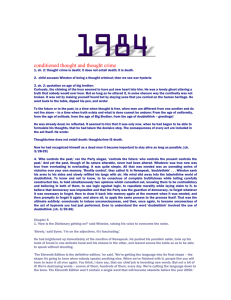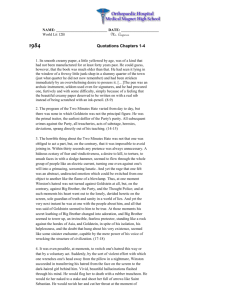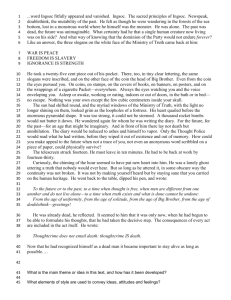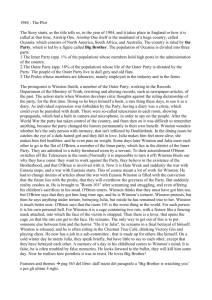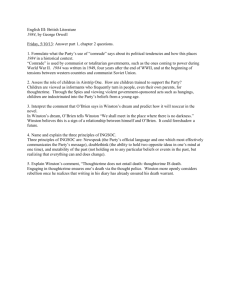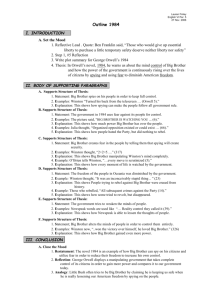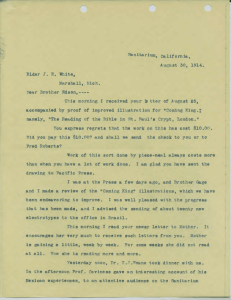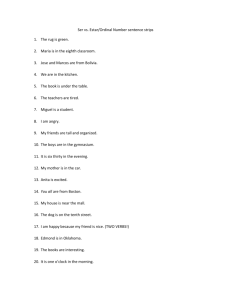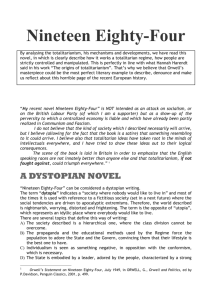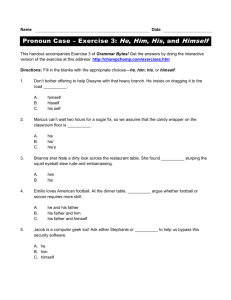1984.firstpart
advertisement
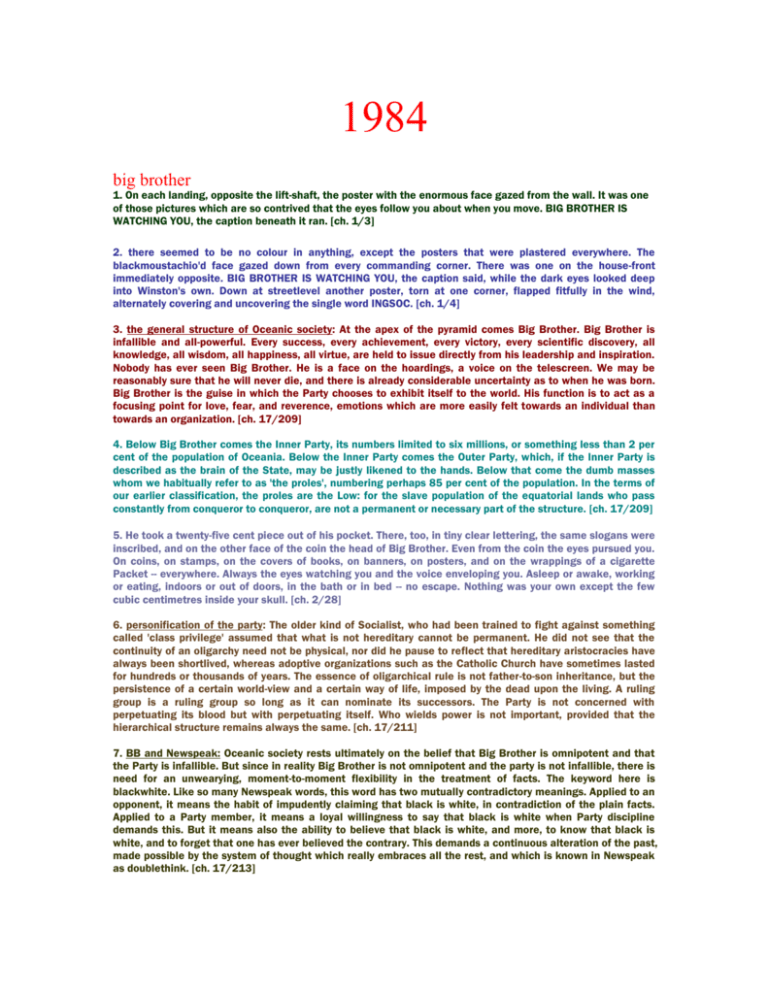
1984 big brother 1. On each landing, opposite the lift-shaft, the poster with the enormous face gazed from the wall. It was one of those pictures which are so contrived that the eyes follow you about when you move. BIG BROTHER IS WATCHING YOU, the caption beneath it ran. [ch. 1/3] 2. there seemed to be no colour in anything, except the posters that were plastered everywhere. The blackmoustachio'd face gazed down from every commanding corner. There was one on the house-front immediately opposite. BIG BROTHER IS WATCHING YOU, the caption said, while the dark eyes looked deep into Winston's own. Down at streetlevel another poster, torn at one corner, flapped fitfully in the wind, alternately covering and uncovering the single word INGSOC. [ch. 1/4] 3. the general structure of Oceanic society: At the apex of the pyramid comes Big Brother. Big Brother is infallible and all-powerful. Every success, every achievement, every victory, every scientific discovery, all knowledge, all wisdom, all happiness, all virtue, are held to issue directly from his leadership and inspiration. Nobody has ever seen Big Brother. He is a face on the hoardings, a voice on the telescreen. We may be reasonably sure that he will never die, and there is already considerable uncertainty as to when he was born. Big Brother is the guise in which the Party chooses to exhibit itself to the world. His function is to act as a focusing point for love, fear, and reverence, emotions which are more easily felt towards an individual than towards an organization. [ch. 17/209] 4. Below Big Brother comes the Inner Party, its numbers limited to six millions, or something less than 2 per cent of the population of Oceania. Below the Inner Party comes the Outer Party, which, if the Inner Party is described as the brain of the State, may be justly likened to the hands. Below that come the dumb masses whom we habitually refer to as 'the proles', numbering perhaps 85 per cent of the population. In the terms of our earlier classification, the proles are the Low: for the slave population of the equatorial lands who pass constantly from conqueror to conqueror, are not a permanent or necessary part of the structure. [ch. 17/209] 5. He took a twenty-five cent piece out of his pocket. There, too, in tiny clear lettering, the same slogans were inscribed, and on the other face of the coin the head of Big Brother. Even from the coin the eyes pursued you. On coins, on stamps, on the covers of books, on banners, on posters, and on the wrappings of a cigarette Packet -- everywhere. Always the eyes watching you and the voice enveloping you. Asleep or awake, working or eating, indoors or out of doors, in the bath or in bed -- no escape. Nothing was your own except the few cubic centimetres inside your skull. [ch. 2/28] 6. personification of the party: The older kind of Socialist, who had been trained to fight against something called 'class privilege' assumed that what is not hereditary cannot be permanent. He did not see that the continuity of an oligarchy need not be physical, nor did he pause to reflect that hereditary aristocracies have always been shortlived, whereas adoptive organizations such as the Catholic Church have sometimes lasted for hundreds or thousands of years. The essence of oligarchical rule is not father-to-son inheritance, but the persistence of a certain world-view and a certain way of life, imposed by the dead upon the living. A ruling group is a ruling group so long as it can nominate its successors. The Party is not concerned with perpetuating its blood but with perpetuating itself. Who wields power is not important, provided that the hierarchical structure remains always the same. [ch. 17/211] 7. BB and Newspeak: Oceanic society rests ultimately on the belief that Big Brother is omnipotent and that the Party is infallible. But since in reality Big Brother is not omnipotent and the party is not infallible, there is need for an unwearying, moment-to-moment flexibility in the treatment of facts. The keyword here is blackwhite. Like so many Newspeak words, this word has two mutually contradictory meanings. Applied to an opponent, it means the habit of impudently claiming that black is white, in contradiction of the plain facts. Applied to a Party member, it means a loyal willingness to say that black is white when Party discipline demands this. But it means also the ability to believe that black is white, and more, to know that black is white, and to forget that one has ever believed the contrary. This demands a continuous alteration of the past, made possible by the system of thought which really embraces all the rest, and which is known in Newspeak as doublethink. [ch. 17/213] the hate 1. The next moment a hideous, grinding speech, as of some monstrous machine running without oil, burst from the big telescreen at the end of the room. It was a noise that set one's teeth on edge and bristled the hair at the back of one's neck. The Hate had started. As usual, the face of Emmanuel Goldstein, the Enemy of the People, had flashed on to the screen. There were hisses here and there among the audience. The little sandy-haired woman gave a squeak of mingled fear and disgust. Goldstein was the renegade and backslider who once, long ago (how long ago, nobody quite remembered), had been one of the leading figures of the Party, almost on a level with Big Brother himself, and then had engaged in counter-revolutionary activities, had been condemned to death, and had mysteriously escaped and disappeared. [ch. 1/13] 2. The horrible thing about the Two Minutes Hate was not that one was obliged to act a part, but, on the contrary, that it was impossible to avoid joining in. Within thirty seconds any pretence was always unnecessary. A hideous ecstasy of fear and vindictiveness, a desire to kill, to torture, to smash faces in with a sledge-hammer, seemed to flow through the whole group of people like an electric current, turning one even against one's will into a grimacing, screaming lunatic. And yet the rage that one felt was an abstract, undirected emotion which could be switched from one object to another like the flame of a blowlamp. Thus, at one moment Winston's hatred was not turned against Goldstein at all, but, on the contrary, against Big Brother, the Party, and the Thought Police; and at such moments his heart went out to the lonely, derided heretic on the screen, sole guardian of truth and sanity in a world of lies. And yet the very next instant he was at one with the people about him, and all that was said of Goldstein seemed to him to be true. At those moments his secret loathing of Big Brother changed into adoration, and Big Brother seemed to tower up, an invincible, fearless protector, standing like a rock against the hordes of Asia, and Goldstein, in spite of his isolation, his helplessness, and the doubt that hung about his very existence, seemed like some sinister enchanter, capable by the mere power of his voice of wrecking the structure of civilization. [ch. 1/15-16] 3. The Hate rose to its climax. The voice of Goldstein had become an actual sheep's bleat, and for an instant the face changed into that of a sheep. Then the sheep-face melted into the figure of a Eurasian soldier who seemed to be advancing, huge and terrible, his sub-machine gun roaring, and seeming to spring out of the surface of the screen, so that some of the people in the front row actually flinched backwards in their seats. But in the same moment, drawing a deep sigh of relief from everybody, the hostile figure melted into the face of Big Brother, black-haired, black-moustachio'd, full of power and mysterious calm, and so vast that it almost filled up the screen. Nobody heard what Big Brother was saying. It was merely a few words of encouragement, the sort of words that are uttered in the din of battle, not distinguishable individually but restoring confidence by the fact of being spoken. Then the face of Big Brother faded away again, and instead the three slogans of the Party stood out in bold capitals: WAR IS PEACE FREEDOM IS SLAVERY IGNORANCE IS STRENGTH [ch. 1/17] conditioned thought and thought crime 1, ch. 2: thought crime is death; it does not entail death; it is death. 2. child accuses Winston of being a thought criminal; then we see war hysteria 3. ch. 2: quotation on age of big brother: Curiously, the chiming of the hour seemed to have put new heart into him. He was a lonely ghost uttering a truth that nobody would ever hear. But so long as he uttered it, in some obscure way the continuity was not broken. It was not by making yourself heard but by staying sane that you carried on the human heritage. He went back to the table, dipped his pen, and wrote: To the future or to the past, to a time when thought is free, when men are different from one another and do not live alone -- to a time when truth exists and what is done cannot be undone: From the age of uniformity, from the age of solitude, from the age of Big Brother, from the age of doublethink -- greetings! He was already dead, he reflected. It seemed to him that it was only now, when he had begun to be able to formulate his thoughts, that he had taken the decisive step. The consequences of every act are included in the act itself. He wrote: Thoughtcrime does not entail death: thoughtcrime IS death. Now he had recognized himself as a dead man it became important to stay alive as long as possible. [ch. 3/28-29] 4. 'Who controls the past,' ran the Party slogan, 'controls the future: who controls the present controls the past.' And yet the past, though of its nature alterable, never had been altered. Whatever was true now was true from everlasting to everlasting. It was quite simple. All that was needed was an unending series of victories over your own memory. 'Reality control', they called it: in Newspeak, 'doublethink' . . . Winston sank his arms to his sides and slowly refilled his lungs with air. His mind slid away into the labyrinthine world of doublethink. To know and not to know, to be conscious of complete truthfulness while telling carefully constructed lies, to hold simultaneously two opinions which cancelled out, knowing them to be contradictory and believing in both of them, to use logic against logic, to repudiate morality while laying claim to it, to believe that democracy was impossible and that the Party was the guardian of democracy, to forget whatever it was necessary to forget, then to draw it back into memory again at the moment when it was needed, and then promptly to forget it again: and above all, to apply the same process to the process itself. That was the ultimate subtlety: consciously to induce unconsciousness, and then, once again, to become unconscious of the act of hypnosis you had just performed. Even to understand the word 'doublethink' involved the use of doublethink. [ch. 3/35-36] Chapter 5 1. 'How is the Dictionary getting on?' said Winston, raising his voice to overcome the noise. 'Slowly,' said Syme. 'I'm on the adjectives. It's fascinating.' He had brightened up immediately at the mention of Newspeak. He pushed his pannikin aside, took up his hunk of bread in one delicate hand and his cheese in the other, and leaned across the table so as to be able to speak without shouting. 'The Eleventh Edition is the definitive edition,' he said. 'We're getting the language into its final shape -- the shape it's going to have when nobody speaks anything else. When we've finished with it, people like you will have to learn it all over again. You think, I dare say, that our chief job is inventing new words. But not a bit of it! We're destroying words -- scores of them, hundreds of them, every day. We're cutting the language down to the bone. The Eleventh Edition won't contain a single word that will become obsolete before the year 2050.' [ch. 5/51] 2. He bit hungrily into his bread and swallowed a couple of mouthfuls, then continued speaking, with a sort of pedant's passion. His thin dark face had become animated, his eyes had lost their mocking expression and grown almost dreamy. 'It's a beautiful thing, the destruction of words. Of course the great wastage is in the verbs and adjectives, but there are hundreds of nouns that can be got rid of as well. It isn't only the synonyms; there are also the antonyms. After all, what justification is there for a word which is simply the opposite of some other word? A word contains its opposite in itself. Take "good", for instance. If you have a word like "good", what need is there for a word like "bad"? "Ungood" will do just as well -- better, because it's an exact opposite, which the other is not. Or again, if you want a stronger version of "good", what sense is there in having a whole string of vague useless words like "excellent" and "splendid" and all the rest of them? "Plusgood" covers the meaning, or "doubleplusgood" if you want something stronger still. Of course we use those forms already. but in the final version of Newspeak there'll be nothing else. In the end the whole notion of goodness and badness will be covered by only six words -- in reality, only one word. Don't you see the beauty of that, Winston? It was B.B.'s idea originally, of course,' he added as an afterthought. [ch. 5/52] 3. A sort of vapid eagerness flitted across Winston's face at the mention of Big Brother. Nevertheless Syme immediately detected a certain lack of enthusiasm. 'You haven't a real appreciation of Newspeak, Winston,' he said almost sadly. 'Even when you write it you're still thinking in Oldspeak. I've read some of those pieces that you write in The Times occasionally. They're good enough, but they're translations. In your heart you'd prefer to stick to Oldspeak, with all its vagueness and its useless shades of meaning. You don't grasp the beauty of the destruction of words. Do you know that Newspeak is the only language in the world whose vocabulary gets smaller every year?' Winston did know that, of course. He smiled, sympathetically he hoped, not trusting himself to speak. Syme bit off another fragment of the dark-coloured bread, chewed it briefly, and went on: 'Don't you see that the whole aim of Newspeak is to narrow the range of thought? In the end we shall make thoughtcrime literally impossible, because there will be no words in which to express it. Every concept that can ever be needed, will be expressed by exactly one word, with its meaning rigidly defined and all its subsidiary meanings rubbed out and forgotten. Already, in the Eleventh Edition, we're not far from that point. But the process will still be continuing long after you and I are dead. Every year fewer and fewer words, and the range of consciousness always a little smaller. Even now, of course, there's no reason or excuse for committing thoughtcrime. It's merely a question of self-discipline, reality-control. But in the end there won't be any need even for that. The Revolution will be complete when the language is perfect. Newspeak is Ingsoc and Ingsoc is Newspeak,' he added with a sort of mystical satisfaction. 'Has it ever occurred to you, Winston, that by the year 2050, at the very latest, not a single human being will be alive who could understand such a conversation as we are having now?' [ch. 5/52-53] 4. Winston's greatest pleasure in life was in his work. Most of it was a tedious routine, but included in it there were also jobs so difficult and intricate that you could lose yourself in them as in the depths of a mathematical problem -- delicate pieces of forgery in which you had nothing to guide you except your knowledge of the principles of Ingsoc and your estimate of what the Party wanted you to say. Winston was good at this kind of thing. On occasion he had even been entrusted with the rectification of The Times leading articles, which were written entirely in Newspeak. He unrolled the message that he had set aside earlier. It ran: times 3.12.83 reporting bb dayorder doubleplusungood refs unpersons rewrite fullwise upsub antefiling In Oldspeak (or standard English) this might be rendered: The reporting of Big Brother's Order for the Day in The Times of December 3rd 1983 is extremely unsatisfactory and makes references to non-existent persons. Rewrite it in full and submit your draft to higher authority before filing. [ch. 4/45]
